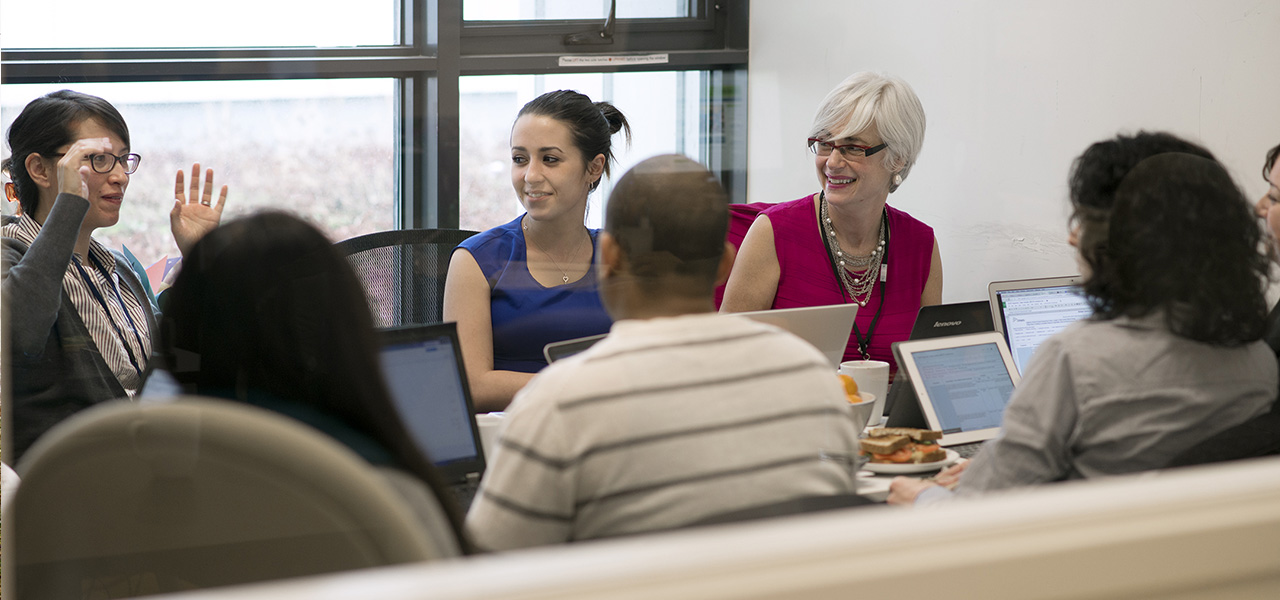
In the heart of Toronto’s Regent Park neighbourhood in a building called Daniels Spectrum on 585 Dundas Street, you’ll find the home of the Centre for Social Innovation (CSI) Regent Park. Located on the building’s third floor and spanning 10,000 square feet, CSI Regent Park caters to a diverse cross-section of social mission organizations and individuals coming together to share ideas, resources, advice, and inspiration. It’s a prime example of the concept of shared spaces and the growing interest of Canada’s non-profit sector in community workspaces. “Shared spaces are part of the new sharing economy and it’s a very positive model that creates extra value for non-profits. It’s about pooling resources and energies together to make us more effective and extend our impact,” says Marjorie Brans, Director of MakeWay project
“Shared spaces are part of the new sharing economy and it’s a very positive model that creates extra value for non-profits. It’s about pooling resources and energies together to make us more effective and extend our impact,” says Marjorie Brans, Director of MakeWay project School for Social Entrepreneurs (SSE) Ontario, of working in CSI Regent Park. Marjorie and her staff, not to mention dozens of their students and volunteers, make use of private offices and shared meeting rooms in the space. Shared spaces are defined in a number of ways:
Shared spaces are defined in a number of ways:
- Co-location: space shared among a number of separate organizations.
- Community hubs: space that brings together service providers to help the surrounding area by offering a range of supports such as language instruction, job training, and after school programs.
- Co-working: sharing of space among freelancers and independent workers.
- Incubators: provide strategic, administrative and/or financial support to small projects and organizations.1
At CSI Regent Park, members have access to fully functioning office space, including high-speed internet, photocopy and fax machines, kitchen facilities, event spaces, audio-visual equipment, mailboxes, and more. For small non-profits such as SSE Ontario, places like CSI Regent Park are more than just a workspace and offer benefits that would be hard to find working in isolation.
“Not only is it a beautiful space in the revitalized Regent Park community, working here has allowed us to access amenities, resources, and networks that would be difficult to forge on our own,” Marjorie says. “We are part of a community doing similar work and are exposed to a flow of useful information, such as networking events, learning opportunities, and grant competitions. It also provides opportunities to create synergies and partnerships that may have otherwise been hard to develop.”
Having a hub of socially-minded non-profits concentrated in one place also has had the added advantage of attracting interested outsiders. For SSE Ontario, this has meant gaining valuable connected and aligned volunteers who discovered their work while visiting the Centre for Social Innovation, but wouldn’t have known of them otherwise.
“It’s great to feel part of a bigger community of changemakers and be surrounded by vibrant and energetic organizations centred on social innovation. When you hear of other organizations’ big wins, it’s extremely motivating. It’s just an energetic and fun place to work.”
Building Capacity, Sharing Values
Shared spaces, like CSI, and social purpose real estate – property and facilities owned and run by mission-based organizations that prioritize community benefit over financial benefits – represent a growing trend in the non-profit sector in Canada.
As part of our commitment to build prosperous economies that benefit all Canadians – and to leverage our experience with shared governance and administrative platforms – MakeWay is exploring how to enhance the potential of shared spaces in Canada.
To provide current context for our look into shared spaces, we commissioned a cross-Canada scan of what’s happening in the field and a high-level assessment of the opportunities and challenges for shared spaces in Canada.
Building Capacity, Sharing Values: Shared Spaces and Social Purpose Real Estate looks at current trends, activities, and needs in the rapidly-growing field of shared spaces and social purpose real estate. It also addresses how shared spaces could be nurtured and scaled across Canada. The full report can be viewed here.
The Building Capacity, Sharing Values report will also inform a conference on non-profit shared space and social purpose real estate taking place in Vancouver this June. The 2015 Building Opportunities Conference brings together delegates from different fields to explore the full complement of real estate activities that the social sector undertakes in North America for a purpose greater than profit maximization.
MakeWay is a member of the Vancouver-based Social Purpose Real Estate Collaborative (SPRE), which is co-presenting the conference with The Nonprofit Centers Network.
To learn more about the 2015 Building Opportunities Conference, visit the event website.
Through these activities, MakeWay is committed to working with sector colleagues to develop the capacity of Canadian organizations to create and sustain shared spaces and social purpose real estate.
1 Centre for Social Innovation publication series: http://socialinnovation.ca/sssi as referenced in Building Capacity, Sharing Values.
